

Christina Becherer
SENIOR DIRECTOR OF GLOBAL STRATEGIC PARTNERSHIPS
Christina Becherer is a seasoned leader in international development and humanitarian action, with more than 18 years of experience in designing and managing partnerships around the world. In addition to acting as senior director of global partnerships at Children International, Christina currently serves as an officer of the board of directors at Partnership for Quality Medical Donations (PQMD).
Children International and NetApp, the intelligent data infrastructure company, partnered this year to cultivate data literacy and stimulate interest in data science among 25,000 children and youth across five countries. As part of NetApp’s Data Explorers Program, we’ve focused on helping participants become “fact-ivists” — young people who drive positive change in their communities by using data to deepen their understanding of global and local issues.
This initiative was made possible by a grant championed by PaShon Mann, Children International board member and NetApp’s Head of Inclusion and Belonging, in collaboration with the Global Strategic Partnerships and Global Programs teams.
Youth in Colombia, Ecuador, Mexico, the Philippines and Zambia have had great success on their fact-ivist journeys, using data to advocate for meaningful causes they deeply care about. Trained facilitators guided one-hour sessions with participants, focusing on three key areas: research, visualization and action. They helped the youth identify compelling data points related to a U.N. Sustainable Development Goal (SDG), create a poster or card to represent their data point and its impact, and share their “fact-ivism” call to action online.
It is incredibly moving to see the global topics youth are passionate about and what they are learning and sharing through this process.
Goal 5 for Gender Equality caught the attention of 17-year-old Martha (at right). She chose to stand for this goal because it emphasizes fairness and respect, ensuring that all children are treated equally in school, at home and in the community. “Just because we are different in our bodies doesn’t mean one is better than the other,” she says. “We all deserve the same chances in life.”
Martha believes that treating everyone equally, regardless of gender, is crucial for building a better and kinder society. Whether it’s in the classroom or at home, she has noticed small but powerful changes. “Our teachers give everyone a chance to lead and speak, and at home, my parents treat us the same,” she shares proudly. While she admits that Zambia hasn’t fully achieved gender equality yet, Martha is hopeful. “We’re moving in the right direction,” she says with a smile. “There’s still more to do, but I believe we can get there.”

Martha, 17, from Zambia, champions SDG 5: Gender Equality, using data to advocate for fairness and equal opportunities in her community.

Nazareth, a student in the Philippines, connects her passion for indigenous culture with SDG 14: Life Below Water, emphasizing the impact of ocean conservation.
Incoming college student Nazareth (at left) said her decision to focus on Goal 14 for Life Below Water was both creative and personal. “I want to study culture, especially that of indigenous peoples,” Nazareth explains. “Life Below Water also is connected to this because the Philippines has so many bodies of water, and that’s really important for us. Every piece of plastic removed, and every drop of waste reduced, makes a difference.”
This program is particularly relevant, given the World Economic Forum’s identification of data science as a critical skills gap with great demand from employers. By fostering data literacy, we’re not only encouraging young people to become informed and engaged citizens, but we’re also exposing them to critical skills that will support them on their path toward quality and sustainable employment.
By preparing youth to take on leadership roles in their communities, we are building a generation of leaders who will be equipped to tackle challenges and foster solutions. Investing in youth is not just an act of generosity; it’s a strategic decision that shapes the future of our societies. Children and youth hold immense power. When we harness and support their potential, we’ll drive remarkable progress across multiple domains.
Nathan, 18, embodied the spirit of my team at Children International when he explained that true progress comes from unity. That’s why he chose Goal 17 for Partnerships for the Goals.

Nathan (left), 18, embraces SDG 17: Partnerships for the Goals, believing that collaboration among people, companies and governments drives real progress.
“I picked SDG 17 because when organizations and companies work as a team, they can do more,” Nathan explains. “If everyone joins hands, we can solve problems like climate change, health and education faster. This goal is important because teamwork makes the country stronger. When people, companies and leaders unite, we can improve schools, hospitals and create more jobs. That helps the economy and makes life better for everyone.”
Comments
diane_winn
Aug 6, 2025
Great post!
You must be logged in to comment. If you have an account, click here to log in.